How WILL became a trusted source for local news
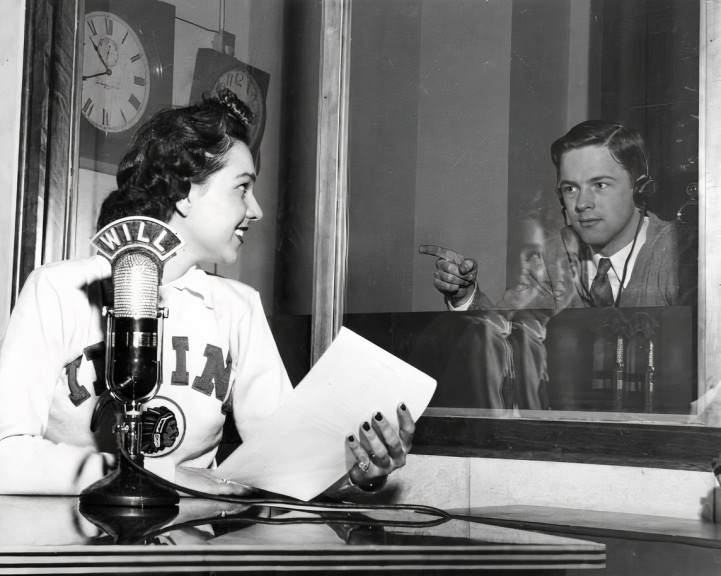
Illinois students get real world experience at WILL in 1950
The beginning
Today, those in Central Illinois often look to WILL as a trusted source of local, state, and national news. But news wasn’t always a main focus of WILL. Sure, early broadcasts featured headlines from the Associated Press, campus announcements, and Illini sports results, but the news coverage was certainly not the in-depth, multimedia resource we rely on today.
When WILL first came on air 100 years ago, it was conceived as an educational radio station—an extension of the University of Illinois’ mission as a land grant institution to make high-quality education accessible to more Illinoisians, more so than ever before. Keeping informed about current events and public affairs is certainly one component of being an educated citizen, but classroom lectures were still the bread and butter of the “University of the Air” through the 1940s.
This began to change after WWII. The School of Journalism introduced undergraduate and graduate curricula in radio in 1945–1946. And in the early 1950s, the department underwent numerous structural changes, becoming the School of Journalism and Communications, with divisions of journalism, advertising, and radio. At the same time, WILL was diversifying its programming as its airtime expanded.
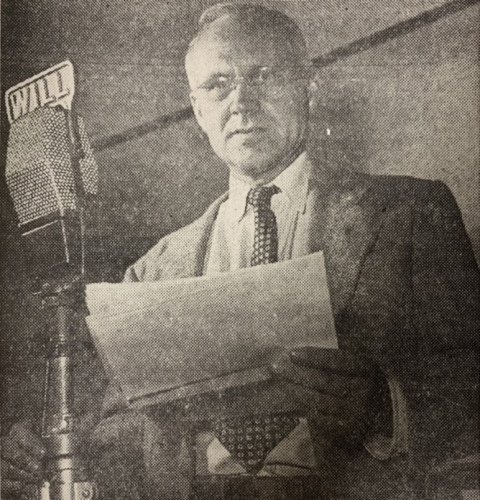
Quincy Howe
In the fall of 1950, WILL established a proper news department, bringing on Donald E. Brown, assistant professor of journalism, to be its first director. Brown divided his time equally between WILL and the School of Journalism and Communications, where he continued to teach courses in radio news. Brown planned to increase local news coverage and extend cooperation between WILL and The Daily Illini. Director of University Broadcasting Robert Hudson said that WILL had always presented news, but this move would “regularize” it.
Also happening around that time, Quincy Howe, a noted CBS analyst who had been hired as an associate professor of journalism, was brought on to present five-minute news analyses on the radio each day at 7:40 am and 11:55 am. Harold Salzman would do a daily 3:30 pm newscast and serve as news editor, while Myron Walden, a senior in journalism, oversaw sports news. Several WILL employees worked in the news department alongside graduate and undergraduate students from the university.
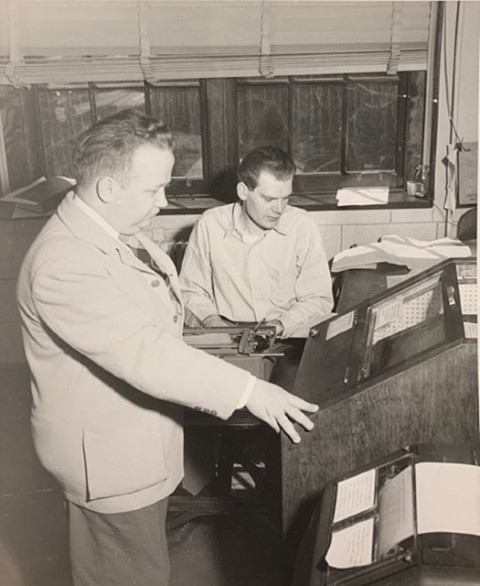
A WILL newscaster prepares his broadcast as Program Director Harold Hill checks the teletype news copy
This relationship between the School of Journalism and Communications (now the College of Media) and WILL was integral to both institutions’ success. WILL benefitted by having renowned journalism scholars and experienced professionals on staff, and students benefitted by being able to use WILL as a laboratory to learn the practical skills of broadcasting. In fact, before the School of Journalism offered formal instruction in broadcasting, students and faculty gained their first broadcasting experience at WILL, learning announcing, dramatics, engineering, music presentation, newscasting, and script writing. This cooperation continued after the School of Journalism expanded its curriculum, and the relationship between the College of Media and Illinois Public Media persists to this day, with the Illinois Student Newsroom at IPM, joint courses, and internship opportunities providing students with vital experience.
The introduction of television broadcasting further expanded WILL’s news offerings. In February 1950, the Board of Trustees appropriated $75,000 for a new FM antenna that was also intended for television. WILL’s television station was slow to start due to inadequate budget and facilities, personnel shortages, a taxpayer lawsuit, and pushback from commercial stations that did not want to compete with government-funded stations. Despite these obstacles, WILL-TV began broadcasting on channel 12 from a makeshift studio under the stands at Memorial Stadium on August 1, 1955. It became the fourteenth educational TV station in the country, thanks to a donated transmitter from General Electric and a $100,000 gift from the Fund for Adult Education, an independent agency of the Ford Foundation.
Henry Lippold's impact
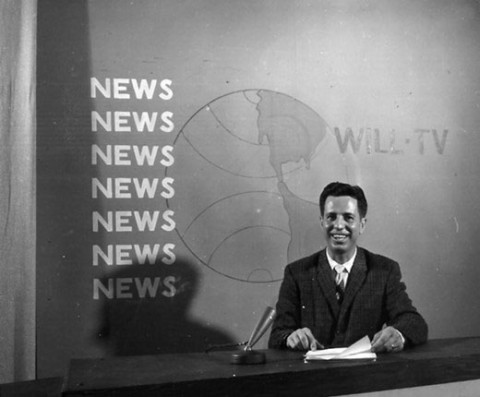
Henry Lippold
One of the most influential and visible figures of news broadcasting during the early years of WILL-TV was Henry Lippold. In addition to serving as WILL’s news director from 1959 to 1972, he was a producer, instructor, and anchorman. He was a tour de force, filled with boundless energy and curiosity, who was eager to capture any newsworthy event, camera in hand. Students often recall Lippold arriving at the studio five minutes before air with a briefcase full of film clips and a trail of wire copy flowing over his shoulder as he made the “mad dash” from the newsroom at Gregory Hall to the studio in Memorial Stadium and later the studio in the converted bakery on Goodwin and Main in Urbana—the very spot Friends Plaza sits today, just outside Campbell Hall
Lippold, who passed away in 2018, was beloved as a teacher. Many of his students went on to illustrious careers in journalism. The key to his success as a teacher, Lippold recalled, was that WILL “provided opportunities for students to interview real people and cover real stories.” Not only did he teach his students the principles of journalism and instill in them his passion for reporting the news, but he also often helped them land their first jobs and gain admission to graduate programs.
In addition to being an effective educator, Lippold was pivotal in solidifying WILL’s reputation as a trustworthy source of local news. Throughout the 1960s, he directed and anchored nightly newscasts on WILL-TV. It was an exciting, if turbulent, time. Lippold recalled, “We covered all the antiwar protests and civil rights marches. Those were the days, my friend!” He would whisk any prominent politician or celebrity visiting campus off to the studio for a quick interview, which often confounded the engineers who preferred more warning.
Lippold also produced and hosted a weekly one-hour show titled Basis for Decision beginning in October 1960,. The show featured panels of experts brought in for in-depth discussions of local and national issues, such as local political races, poverty, race relations, zoning laws, infrastructure, and health care. Always one to challenge the audience’s assumptions and encourage them to think critically, Lippold often brought together guests with wildly opposing viewpoints and “controversial” figures, including civil rights activists, student protestors, countercultural personalities, politicos from both extremes, and Vietnam supporters and opponents.
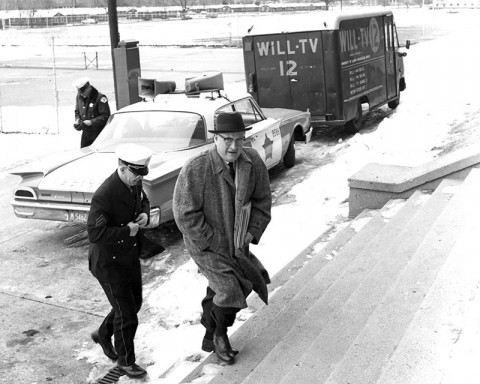
In that same year, WILL began televising election returns, conducting the first remote telecast of election coverage in Champaign County history that November. Broadcasting live from the courthouse in Urbana, Lippold—a self-proclaimed “election addict”—and a team of 30 students and staffers provided coverage of local and state contests while also reporting national election results received over teletype from the newsroom in Gregory Hall. Lippold conducted on-the-spot interviews with candidates, and university faculty provided analysis of the returns.
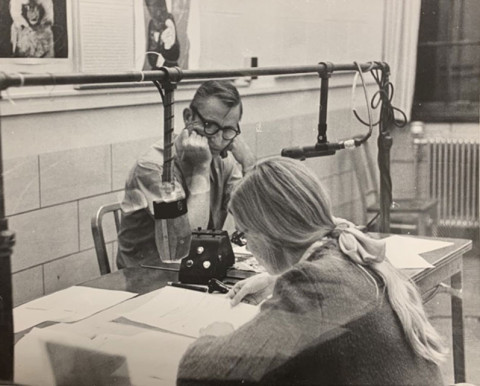
Election Night Nov. 3, 1970, John Cramer and Barb Schleck
In the days before computer tabulation, election results had to be calculated by hand using often faulty arithmetic. To make the process quicker and more reliable, Lippold worked with Professor Don Bitzer of the Physics Department to tabulate results using the Programmed Logic for Automatic Teaching Operations (PLATO) computer system run from ILLIAC I. “We set up a battery of phones in the studio to gather results,” Lippold said. “But how to get the results to the computer in the physics building?” WILL-TV staff and students wrote results on cards and held them in front of a camera, which was hooked up to the physics building. After PLATO tabulated the results, they were sent back to the studio for broadcast. “It was an exciting first for us,” Lippold said. On covering elections, he recalled, “Elections were a lot of work but also a lot of fun. They are the lifeblood of our country, and we did our level best to cover them.”
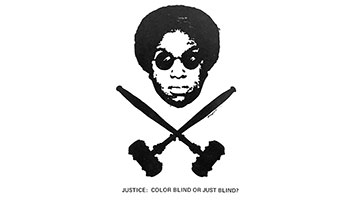
Illustration for installment of series on African Americans in Central Illinois from Dec. 1968 tv program booklet
He also produced a multipart docuseries in 1968–69 on the lives and experiences of African Americans in Central Illinois, covering the topics of soul food, African dance and culture, school desegregation, housing and urban renewal, and the justice system. You can watch a powerful spoken-word performance from that series here. This docuseries set a precedent for the in-depth reporting of complex issues and examination of diverse experiences that Illinois Public Media still prides itself on today.
Legacy of Donald Mullally
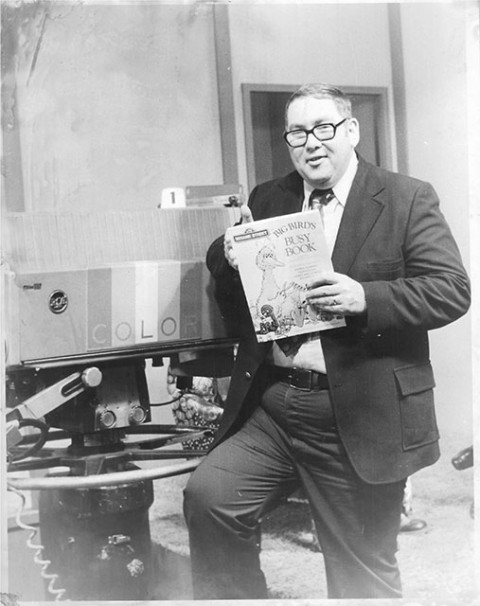
Don Mullally
During the 1970s, programming on WILL radio and television became more focused on news and public affairs as a part of the growing national network of public broadcasting stations. One of the people at the helm of this change was Don Mullally, who succeeded Frank Schooley (WILL’s first full-time employee, brought on in 1929) as director of broadcasting and general manager of WILL in 1973. Mullally, who passed away in 2015, is credited with not only revitalizing WILL but also saving NPR from the brink of bankruptcy in 1983.
As chair of NPR’s Board of Directors, Mullally devised a new funding structure for NPR where federal funds would now go directly to member stations who would buy programming from NPR, and NPR would seek out large private donors. This system ensured a steady revenue stream for NPR, while also giving local stations more autonomy over their own programming so they could cater specifically to their area. Mullally’s vision marked a turning point in how public broadcasting is funded, and this symbiotic structure he created is still in place today.
Back in Champaign-Urbana, Mullally helped transform WILL from an educational station that primarily served the university community to one that served the interests of the entire area. He diversified programming and delegated music to the WILL-FM 90.9 and news and information to WILL-AM 580. A major innovation of his was the development of a news magazine format for morning radio so that busy listeners could hear the day’s top stories and interesting features in a shorter form. In December 1977, he instated WILL’s Weekday 580 news magazine program—a local forerunner of NPR’s Morning Edition, which came on air in November 1979—and later Focus 580 and The Afternoon Magazine. You can read more about Focus 580, hosted by David Inge from 1981 to 2012, in an article by Jim Meadows here.
Thanks to people like Don Mullally, Henry Lippold, and the many journalists, engineers, producers, students, and other staff members who have worked at WILL over the years, our ability to report on the issues that affect the diverse residents of Illinois has only continued to grow. Today the Illinois Public Media newsroom provides daily news about Illinois as well as in-depth reporting on agriculture, education, the environment, health, and politics.

